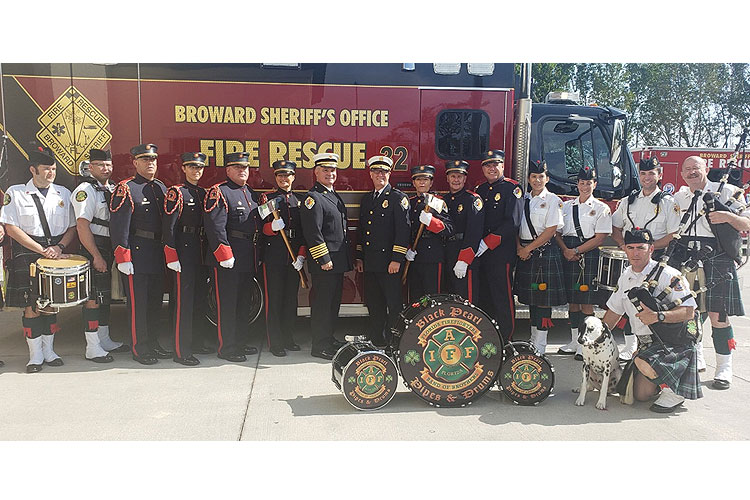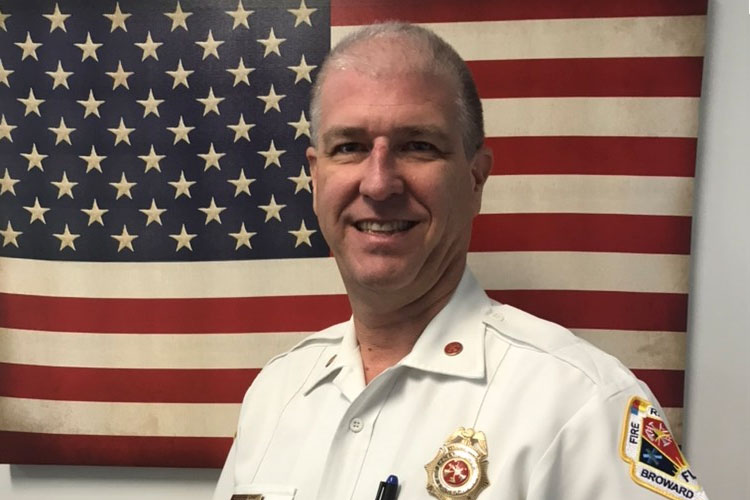

By Todd LeDuc
After nearly 30 years of service, rising through the ranks to hold both assistant and deputy fire chief positions, the time finally arrived for my retirement from the Broward County (FL) fire service. The day itself—with its formal retirement ceremonies with the “Black Pearl Pipe and Drums,” the Broward Honor Guard, and stories traditions of a chief fire officers retirement ceremony—was filled with a rush of mixed emotions. As I begin my journey of the next chapter and second career, I accepted an offer to join Life Scan Wellness Centers as their Chief Strategy Officer and executive team member. This was an easy decision, as Life Scan Wellness provides early-detection comprehensive NFPA 1582 physicals to some nearly 40,000 firefighters and law enforcement officers across the United States in more than 20 states, aligning with my passion and advocacy for firefighter health, wellness, and survival.
My new role and interacting with a number of retired colleagues who attended my retirement ceremony and sharing “life after the fire service” started me thinking as to our obligation to continue to monitor retired members’ health and well-being after their service has concluded. Unfortunately, not enough evidence-based research has been undertaken in this population of firefighters. Some studies have been undertaken to further understand the unique health risks of retired firefighters, particularly in the areas of occupational cancers and behavioral health. However, we know that the three most preventable occupational diseases claiming our active-duty firefighters are the triad of cancer, cardiovascular, and behavioral health disease (substance dependency and addiction, sleep disturbance, stress, post traumatic stress disorder, and suicide).
RELATED
10 Things You Will Miss When All is Said and Done
When is a Firefighter No Longer?
Firefighter Retirement: Dreams Do Come True, But Not in All Cases
Retirement from the Fire Service: Five Needs for Success
It stands to reason that if firefighters have documented occupational health risks then some of those same disease processes may follow us into our retirement years. Years of toxic exposures to a plethora of carcinogenic-linked chemicals and particulate surely may contribute to ongoing manifestations with certain types of cancers. This may be exacerbated by the stressful conditions that firefighters operate in and the toll that lifestyle behaviors may take over many years of service. One of the starkest examples of this is the number of 9/11 first responders that we continue to lose from cancers some nearly two decades after that horrific day. It also stands to reason that, given the tight-knit culture of the fire service, retired members who are more distanced from the camaraderie of active duty may become disassociated and isolated. This could prove deleterious to these retired members’ behavioral health and mental wellness. Along with the natural aging process, there may also be cardiovascular effects that come from repeated exposure to extreme conditions, poor lifestyle coping choices, and repeated exposures to numerous toxins.
A retired friend and colleague recently asked: “Chief, shouldn’t their be a national standard for medical surveillance of retired firefighters?” I have written previously detailing efforts by the International Association of Fire Chiefs to determine how many firefighters in the U.S. were not receiving occupational appropriate annual medical exams. The results of that survey research confirmed that we still have much work to do to ensure that every firefighter in America has access to and receives an occupational-specific medical exam. Certainly, if we are not quite there yet for our active-duty firefighters, what are we doing to provide early detection for our retirees? I am proud to say that my former department, Broward County, offers voluntary access to Life Scan Wellness Center NFPA 1582/1583 comprehensive and integrated physical including behavioral screenings. The challenge is to remember the retired members of our fire service community. Our retired firefighters deserve further occupational health research, medical monitoring, and access to early detection.
Our retired fire service members served their communities—America’s communities- large and small, paid and volunteer—and we owe them a debt for their service. Much as with our nation’s veterans, we as a fire service should be responsible to look after our retirees’ ongoing health risks.
 Todd J. LeDuc, MS, CFO, FIFirE, retired after nearly 30 years as assistant fire chief of Broward County, Florida, an internationally accredited career metro department. He is Secretary of the International Association of Fire Chief’s Safety, Health & Survival Board. He is the Chief Strategy Officer for Life Scan Wellness Centers, one of the nation’s leading providers of firefighter physicals. He is also editor in chief of Surviving the Fire Service and is sought after as an international speaker. He can be reached at Todd.LeDuc@lifescanwellness.com.
Todd J. LeDuc, MS, CFO, FIFirE, retired after nearly 30 years as assistant fire chief of Broward County, Florida, an internationally accredited career metro department. He is Secretary of the International Association of Fire Chief’s Safety, Health & Survival Board. He is the Chief Strategy Officer for Life Scan Wellness Centers, one of the nation’s leading providers of firefighter physicals. He is also editor in chief of Surviving the Fire Service and is sought after as an international speaker. He can be reached at Todd.LeDuc@lifescanwellness.com.
MORE
Behavioral Health: Rescuing the Rescuers
Excellence Requires Commitment to Action and Empowerment
Three Chicken Dinners and Fire Service Physicals
Firefighter Physicals: A Picture is Worth a Thousand Words
Firefighter Behavioral Health and Suicide: A Rising Tide
This commentary reflects the opinion of the author and does not necessarily reflect the opinions of Fire Engineering. It has not undergone Fire Engineering‘s peer-review process.

